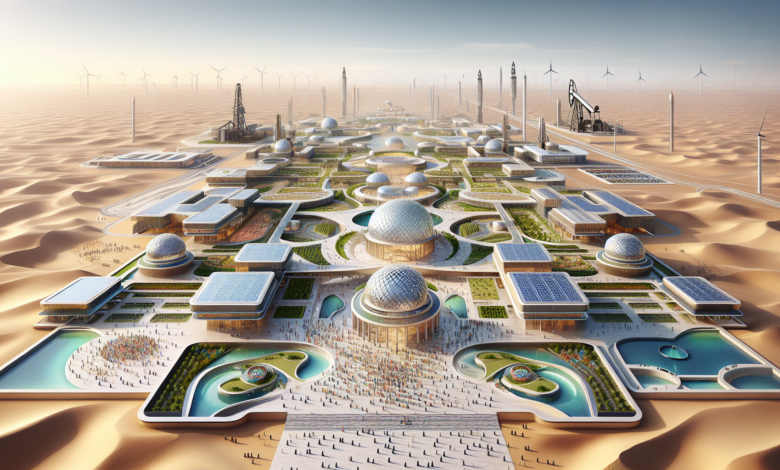
New Middle East Universities Transforming the Post-Oil Knowledge Economy
The Middle East is undergoing a remarkable transformation as new universities shape the post-oil knowledge economy. Countries like Saudi Arabia, the UAE, and Qatar are investing heavily in higher education to diversify their economies and prepare for a future less dependent on fossil fuels. This shift has an impact on not only the region’s educational landscape but also its economic sustainability and global competitiveness.
These new institutions are at the forefront of innovation, focusing on areas such as artificial intelligence, sustainable energy, and space exploration. Universities like KAUST in Saudi Arabia, NYU Abu Dhabi, and Qatar University are attracting global talent and fostering groundbreaking research. Their efforts align with ambitious national visions, such as Saudi Arabia’s Vision 2030, to create a skilled workforce ready for the Fourth Industrial Revolution and to drive economic diversification in the digital age.
Transforming Oil Wealth into Educational Investment
Government Initiatives and Funding
Middle Eastern countries are channeling their oil wealth into educational investments to diversify their economies. Saudi Arabia has opened 35 universities since 2000, including King Abdullah University of Science and Technology (KAUST). The UAE has established 33 universities in the same period, with over 140,000 students enrolled across 71 institutions. Qatar’s Education City hosts eight prestigious universities, enrolling more than 10,000 students. These initiatives are backed by substantial funding, with Saudi Arabia investing over $10 billion, the UAE $3 billion, and Qatar $1.3 billion in education.
Partnerships with Western Universities
To enhance their educational offerings, many Middle Eastern institutions have formed partnerships with Western universities. NYU Abu Dhabi, Sorbonne University Abu Dhabi, and University College London Qatar are prime examples of these collaborations. These partnerships bring a global dimension to the region’s education system, attracting international talent and expertise.
Focus on STEM Education
STEM education has become a priority in the Middle East, with governments and institutions aiming to fill the skills gap and prepare students for future jobs. This focus aligns with ambitious economic goals, such as the UAE’s plan to grow its economy by 7% in 2024 and Saudi Arabia’s Vision 2030. NEOM University, set to enroll 10,000 students by 2030, will serve as an intellectual engine for Saudi Arabia’s futuristic green city project.
Building a Knowledge-Based Workforce
Scholarship Programs
Middle Eastern countries are investing heavily in scholarship programs to attract international talent. The King Abdulaziz Scholarships offer fully funded opportunities for undergraduate, master’s, and PhD degrees at King Abdulaziz University in Saudi Arabia. Similarly, the Kuwait Government and UAE University provide comprehensive scholarships covering all expenses for international students across various academic fields.
Emphasis on Research and Innovation
Saudi Arabia’s Vision 2030 places significant emphasis on research and development within universities. These institutions are becoming vital contributors to cutting-edge research, aligning their agendas with national priorities such as renewable energy, water conservation, and health sciences. The government offers funding opportunities to support research excellence and innovation, leading to improved global rankings for Saudi universities and increased patent generation.
Attracting Global Talent
To attract global talent, Middle Eastern countries are implementing innovative residency schemes for professionals in research and development across various industries. Saudi Arabia’s 2021 labor reforms package grants employees greater freedom to change jobs and travel abroad. The region offers tax-free salaries and additional benefits such as housing allowances, education support, and comprehensive health insurance plans to lure international professionals.
Impact on Regional and Global Education
Shifting Perceptions of Middle Eastern Education
The Middle East has transformed its educational landscape, attracting global attention. Dubai, for instance, has become an educational hub with nearly 25 international branch campuses offering diverse curricula. This shift has changed perceptions, with the region now seen as innovative and ambitious, welcoming global partnerships and travelers.
Contribution to Global Research
Middle Eastern universities are making significant contributions to global research. KAUST in Saudi Arabia aims to lead in clean hydrogen and artificial intelligence research. It ranked 19th globally in the Nature Index of “Rising Stars” for high-quality science and is first in the Times Higher Education Arab University Rankings.
Creating Educational Hubs
Countries like the UAE, Qatar, and Saudi Arabia have established educational hubs to attract foreign investment and talent. Dubai Knowledge Park, Dubai International Academic City, and Qatar’s Education City are prime examples. These hubs host prestigious international universities, fostering a knowledge-based economy and providing high-quality education to both local and international students.
The Middle East’s investment in higher education is causing a revolution in the region’s educational landscape and has an influence on its economic future. New universities in countries like Saudi Arabia, the UAE, and Qatar are playing a crucial role to diversify economies and prepare for a post-oil era. These institutions are not just centers of learning but also hubs for innovation, focusing on cutting-edge fields such as AI, sustainable energy, and space exploration. Their efforts align with ambitious national goals to create a skilled workforce ready for the challenges of the digital age.
This educational transformation has an impact on both regional and global education scenes. Middle Eastern universities are now making significant contributions to worldwide research, changing how the region is seen in the academic world. The creation of educational hubs has drawn foreign investment and talent, fostering a knowledge-based economy. As these countries continue to channel their resources into education, they are setting the stage for a future where knowledge, rather than oil, becomes their most valuable asset.







[…] of UAE’s economic development strategy. It plays a crucial role to shape a competitive, knowledge-based economy. This initiative supports UAE’s ambitious 2031 vision and Centennial 2071 […]
[…] golden ticket to attract international talent became a maze of tax complications. The “Beckham Law,” named after football […]